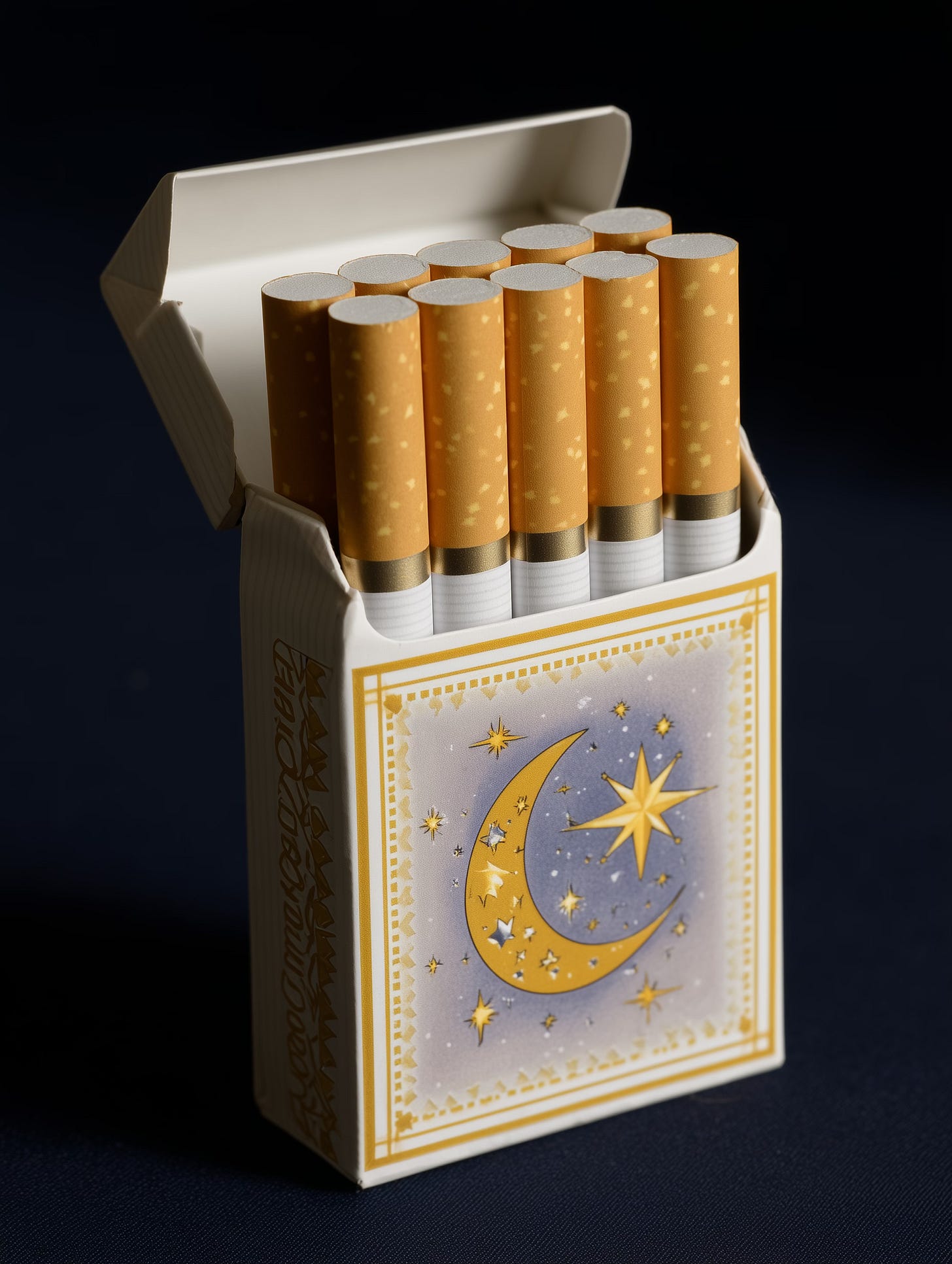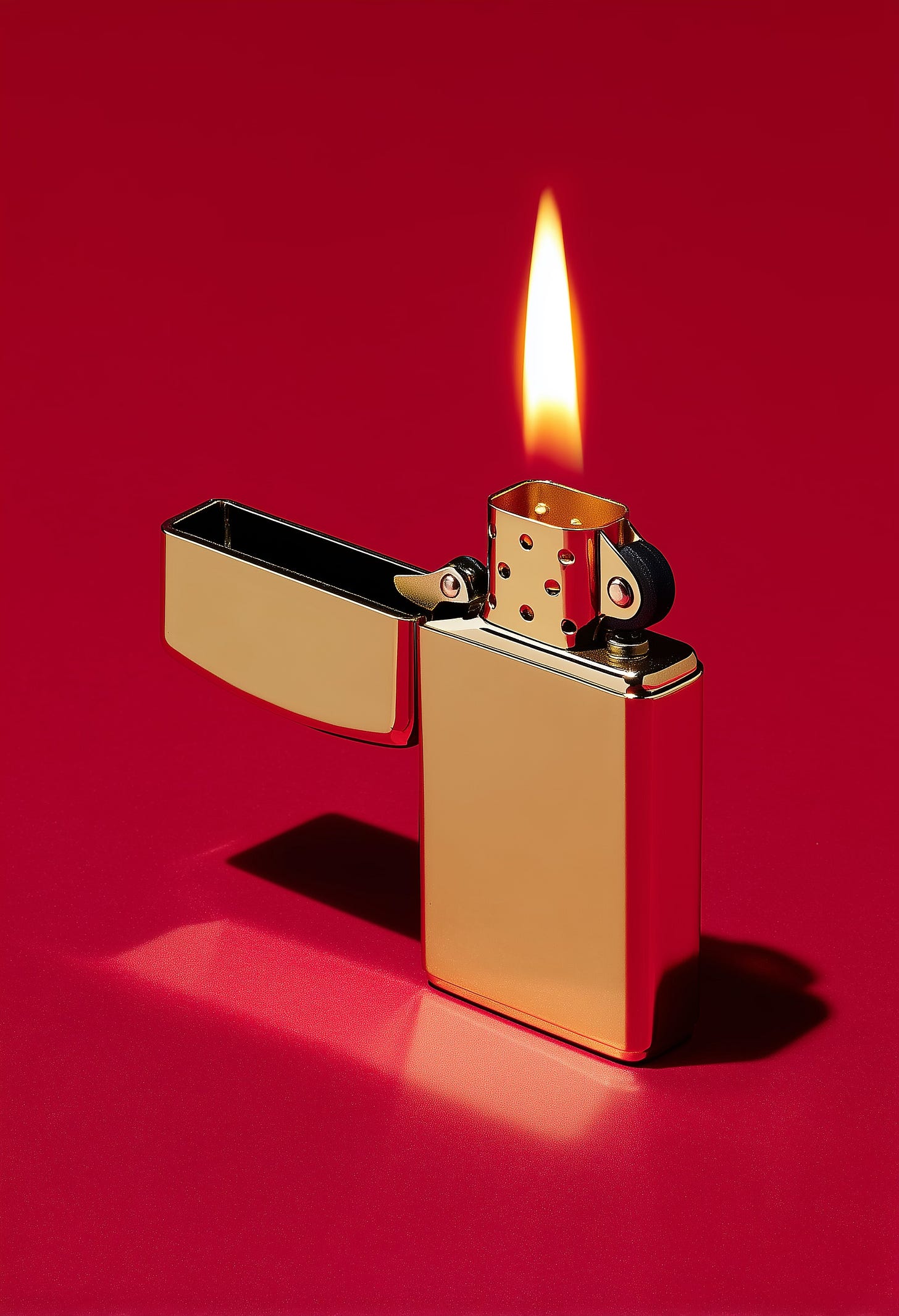Smoke Signals: A Gen X Journey from Cigarettes to Clarity
In honor of World No Tobacco Day
I grew up in a house filled with the scent of secondhand smoke. Both of my parents were smokers through most of my childhood. Like many kids born in the '70s and raised in the '80s, I came of age in a world where smoking was everywhere: on airplanes, in restaurants, at the dinner table, even in hospital waiting rooms. It was as common as breathing — and almost as automatic.
The summer I turned 18, I started smoking. It was 1995, and I was working as a caricature artist at Six Flags. My coworkers were mostly guys, funny, talented, free-spirited — and they all smoked. Taking smoke breaks with them was a ritual. Caricature artists are comedians at heart, and smoke breaks felt like backstage passes to the best show in town.
By the time I got to college, smoking wasn’t just a habit. It was part of my identity. I lit up at frat parties, outside the drawing studios, during late-night walks across campus. I met strangers over a shared lighter. I did terribly my first semester at UCF — smoking didn’t help with focus or waking up for class — and I lost my academic scholarship. But even when I transferred to the University of Kansas, I brought the habit with me.
Smoking was fun. It was social. It seemed to dissolve barriers with people. Strangers lit each other's cigarettes. Smokers were a circle of trust, huddled together outside dorms, studios, and offices. It was a way to feel connected — like you were part of something.
I smoked on planes — yes, actually on planes. When I flew to Paris to study with Parsons’ summer program, the French airline still allowed smoking. I remember sitting 30,000 feet in the air, lighting a cigarette as casually as opening a can of soda. Different era. Different lungs.
I brought my habit to every college I attended and every job I had. It wasn’t just about the cigarette — it was about what it gave me: a moment to pause, to socialize, to be present without pressure. Smoking helped me read the room, get a read on the politics, and catch the subtext of an office or party.
I knew that I was going to give up smoking eventually, especially after developing a bad cough and coughing up blood after smoking cloves with my friends in Ohio. There was a cigar shop that sold them, and while they tasted great, they were brutal on the lungs.
💨 Smoke as a Silent Cry
Smoking wasn’t just social. It wasn’t just about looking cool or fitting in. It was also a coping mechanism — a way to breathe through moments when life felt unbearable.
When feelings got too big, when I felt invisible or lost or on the edge of something I couldn’t name, I could light a cigarette. Draw the fire into my lungs. Feel the burn and think:
“I wish I was dead. And now I’m just one step closer.”
Of course, the cigarette never fixed anything. It didn’t take away the pain — just softened it with smoke. There was something cathartic about flicking the cigarette away, like I was casting my problems into the wind. But all I was doing was hurting myself. And the earth.
Those butts I flicked — they seemed to vanish. But they’re probably still out there somewhere, only partially deteriorated. Just like emotional scars — they don’t disappear, they just change shape.
I tried smoking cessation where they shock you behind the ear, and I quit for a few months — then started again. The grip of addiction was emotional as much as physical. I still loved the ritual, the camaraderie, the defiance.
But then, 21 years after I started smoking, I got pregnant.
And that was it.
No patches, no gum, no tricks. I quit. Instantly. Because I knew I wasn’t just breathing for me anymore.
Now I’m a Gen X mom to a Gen Alpha kiddo — and I want to be alive as long as possible. I want to run beside her, not behind her. I want to model health in a way that rewrites the script I inherited. And I want her to never know me as a smoker.
✨ 5 Benefits of Not Smoking (From Someone Who’s Been There)
Better Lung Function
I can jog farther without feeling winded. Movement feels light again.Improved Sense of Taste and Smell
Food tastes brighter. The air smells clearer. Life is more sensed.No More Smokers' Cough
That chronic, barking cough? Gone. My mornings are peaceful again.More Energy + Endurance
I recover faster. I feel younger. My body thanks me daily.Freedom
I’m no longer tethered to cravings or rituals. I own my breath, my time, my life.
📜 A Brief History of Smoking
Tobacco use dates back over 5,000 years. Indigenous peoples of the Americas used it in ceremonies and healing practices. When European colonizers arrived in the 1500s, they brought tobacco back with them — and its use spread rapidly across the globe.
By the 20th century, smoking was mainstream. It was marketed as glamorous, sophisticated, even healthy. Doctors endorsed it. Hollywood romanticized it. It wasn’t until the 1960s that the U.S. Surgeon General publicly linked smoking to cancer, triggering a slow but steady shift in public perception.
Despite growing awareness, tobacco companies continued to find ways to hook new generations — through flavored products, sleek packaging, and deceptive marketing.
🚭 About World No Tobacco Day
Held annually on May 31, World No Tobacco Day was established by the World Health Organization in 1987. Its mission is to raise awareness about the dangers of tobacco and to push for policies that reduce tobacco use worldwide.
The theme for 2025 is:
“Bright Products. Dark Intentions. Unmasking the Appeal.”
It focuses on exposing how tobacco companies use vibrant packaging and addictive flavors to target youth — and how even seemingly "modern" or "safer" products continue to cause harm.
I don’t regret my smoking years. They were a part of my story, and I learned from them. But I’m proud to have turned the page. I don’t miss the ash, the cough, or the cloud of denial I used to live in.
Now, every breath I take feels like a quiet revolution. I’m here. I’m alive. And I choose to stay that way.
"I used to light a cigarette when life felt too heavy. Now I take long walks, breathe deep, and choose life instead."







